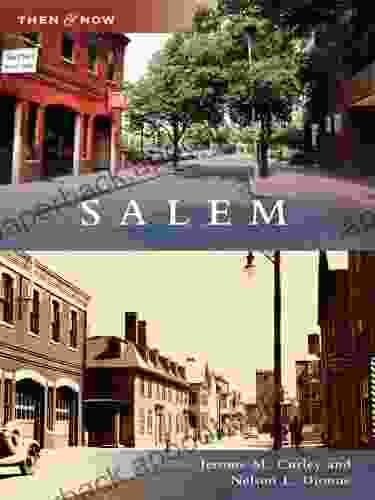Delving into the Descriptive Complexity of Formal Systems: A Comprehensive Guide

4.6 out of 5
| Language | : | English |
| File size | : | 69201 KB |
| Text-to-Speech | : | Enabled |
| Screen Reader | : | Supported |
| Enhanced typesetting | : | Enabled |
| Print length | : | 265 pages |
Formal systems play a crucial role in various disciplines, including computer science, mathematics, and linguistics. Understanding the complexity of these systems is essential for analyzing their properties and limitations. Descriptive complexity, a subfield of finite model theory, investigates the computational complexity of expressing properties of formal systems using logical formulas.
This comprehensive guide provides an in-depth exploration of the descriptive complexity of formal systems. We will delve into the foundations, techniques, and applications of this fascinating field. Researchers, students, and anyone interested in the complexities of formal systems will find this guide invaluable.
Foundations of Descriptive Complexity
Descriptive complexity is rooted in finite model theory, which studies the properties of finite structures. A structure in this context consists of a set of elements and relations defined on those elements. Logical formulas are used to express properties of these structures.
The descriptive complexity of a property is determined by the computational complexity of evaluating whether a given structure satisfies the property. This complexity is typically measured in terms of time and space requirements.
Descriptive Complexity Classes
Descriptive complexity theory classifies properties of formal systems into various complexity classes. Some of the most important classes include:
- FO: First-Free Download logic, which allows for the expression of properties using quantifiers, conjunctions, disjunctions, and negations.
- SO: Second-Free Download logic, which extends FO with quantification over sets of elements.
- MSO: Monadic second-Free Download logic, which restricts SO to quantification over unary relations.
- CFL: Context-free languages, which are languages that can be generated by context-free grammars.
- REG: Regular languages, which are languages that can be recognized by finite automata.
Techniques for Descriptive Complexity Analysis
Analyzing the descriptive complexity of formal systems involves various techniques, including:
- Model checking: Verifying whether a given structure satisfies a logical formula.
- Satisfiability checking: Determining whether there exists a structure that satisfies a logical formula.
- Complexity reduction: Reducing the complexity of evaluating a formula by transforming it into an equivalent formula in a lower complexity class.
- Game theory: Using game-theoretic techniques to analyze the complexity of evaluation.
Applications of Descriptive Complexity
Descriptive complexity has numerous applications in various fields, including:
- Database theory: Analyzing the complexity of query evaluation in relational databases.
- Knowledge representation: Understanding the expressive power and computational complexity of knowledge representation formalisms.
- Artificial intelligence: Investigating the complexity of reasoning tasks in AI systems.
- Software verification: Verifying the correctness of software programs using model checking.
- Computational complexity theory: Classifying the complexity of computational problems based on their descriptive complexity.
Descriptive complexity is a powerful tool for understanding the properties and limitations of formal systems. This comprehensive guide has provided an in-depth exploration of the foundations, techniques, and applications of this fascinating field. Researchers, students, and anyone interested in the complexities of formal systems will find this guide an invaluable resource.
For further exploration of descriptive complexity, we recommend the following resources:
- Wikipedia article on Descriptive Complexity
- Lecture notes by Erich Grädel
- Lecture notes by Chris Norman
4.6 out of 5
| Language | : | English |
| File size | : | 69201 KB |
| Text-to-Speech | : | Enabled |
| Screen Reader | : | Supported |
| Enhanced typesetting | : | Enabled |
| Print length | : | 265 pages |
Do you want to contribute by writing guest posts on this blog?
Please contact us and send us a resume of previous articles that you have written.
 Book
Book Novel
Novel Page
Page Chapter
Chapter Text
Text Story
Story Genre
Genre Reader
Reader Library
Library Paperback
Paperback E-book
E-book Magazine
Magazine Newspaper
Newspaper Paragraph
Paragraph Sentence
Sentence Bookmark
Bookmark Shelf
Shelf Glossary
Glossary Bibliography
Bibliography Foreword
Foreword Preface
Preface Synopsis
Synopsis Annotation
Annotation Footnote
Footnote Manuscript
Manuscript Scroll
Scroll Codex
Codex Tome
Tome Bestseller
Bestseller Classics
Classics Library card
Library card Narrative
Narrative Biography
Biography Autobiography
Autobiography Memoir
Memoir Reference
Reference Encyclopedia
Encyclopedia Steve Ashton
Steve Ashton Norbert Reichert
Norbert Reichert Jim Hasse
Jim Hasse Jennifer Coken
Jennifer Coken Mac Robertson
Mac Robertson Jeff Kirkham
Jeff Kirkham Johann Van Loggerenberg
Johann Van Loggerenberg Jean Kinney Williams
Jean Kinney Williams Jerry Mander
Jerry Mander Tyson Seburn
Tyson Seburn Jim O Neil
Jim O Neil J Daniels
J Daniels Jean Pierre Le Pan
Jean Pierre Le Pan Steven Heine
Steven Heine Joel Goldman
Joel Goldman Joanna Wylde
Joanna Wylde Joe Hinchliffe
Joe Hinchliffe Yun Ji
Yun Ji Terese Pencak Schwartz
Terese Pencak Schwartz Jenny Colgan
Jenny Colgan
Light bulbAdvertise smarter! Our strategic ad space ensures maximum exposure. Reserve your spot today!

 Fyodor DostoevskyUncover the Hidden Gems of American Hospitality: Journey Through "Back Roads...
Fyodor DostoevskyUncover the Hidden Gems of American Hospitality: Journey Through "Back Roads... Ike BellFollow ·9.5k
Ike BellFollow ·9.5k J.D. SalingerFollow ·5.6k
J.D. SalingerFollow ·5.6k Andrew BellFollow ·4.6k
Andrew BellFollow ·4.6k Juan ButlerFollow ·3.2k
Juan ButlerFollow ·3.2k Kendall WardFollow ·16.1k
Kendall WardFollow ·16.1k Caleb LongFollow ·2k
Caleb LongFollow ·2k Christian CarterFollow ·13.2k
Christian CarterFollow ·13.2k Elias MitchellFollow ·6.1k
Elias MitchellFollow ·6.1k

 Preston Simmons
Preston SimmonsEmbark on a Literary Odyssey with "Walking on Water": A...
Prepare to be swept...

 Ernesto Sabato
Ernesto SabatoUnlocking Policy Analysis: Dive into the Intricacies of...
: The Realm of Policy...

 Forrest Reed
Forrest ReedThe Road to Grace Walk: A Journey of Spiritual Growth and...
In the tapestry of life, we...

 Evan Simmons
Evan SimmonsTip Neill and the Democratic Century: A Political Odyssey...
The Rise of a Political Giant In the...

 Mark Mitchell
Mark MitchellUnwrap the Magic: A Review of Christmas Memory by Richard...
As the cold winter months draw near, and...

 Percy Bysshe Shelley
Percy Bysshe ShelleyBeyond the Veil: Delve into the Realm of Spirit with In...
Unveiling the Mysteries of the Unseen...
4.6 out of 5
| Language | : | English |
| File size | : | 69201 KB |
| Text-to-Speech | : | Enabled |
| Screen Reader | : | Supported |
| Enhanced typesetting | : | Enabled |
| Print length | : | 265 pages |










